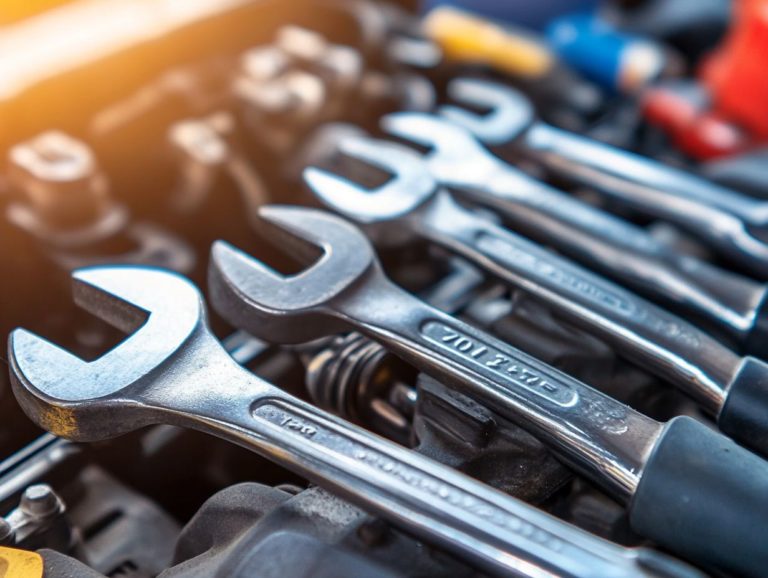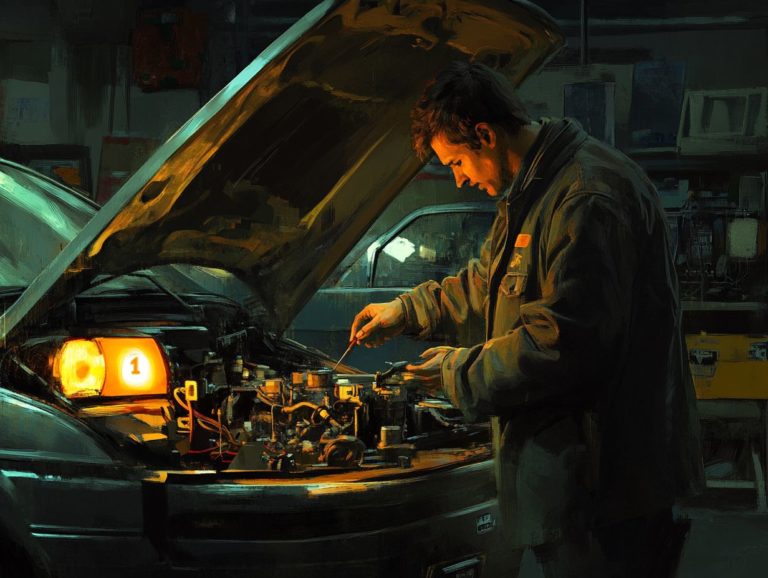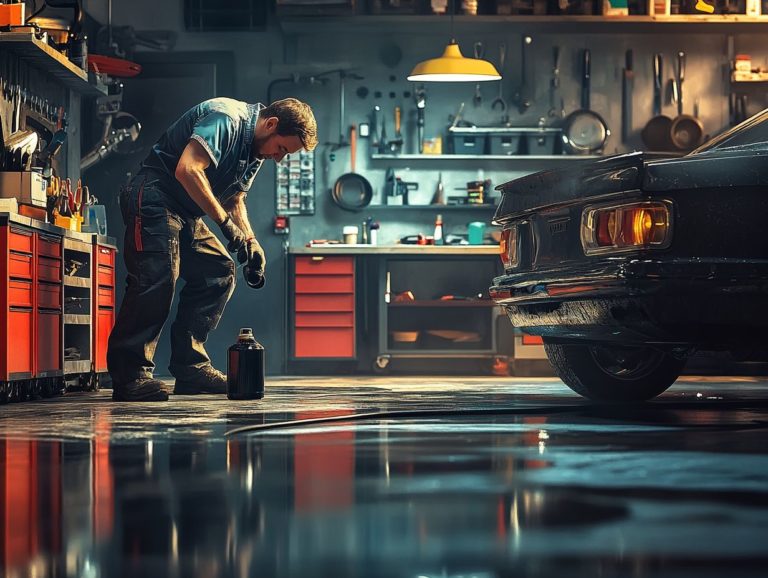Understanding Common Car Repair Warranties
Understanding car repair warranties can indeed feel overwhelming, especially when those unexpected repairs come knocking at your door. Don t wait until a repair bill surprises you. Learn about warranties now to save money down the road!
Understanding what a car repair warranty entails, the various types available, and the specifics of what they cover can save you both time and money. Each type has unique advantages.
Let s dive into what you need to know to protect your wallet and keep your car running smoothly!
Contents
- Key Takeaways:
- Overview of Car Repair Warranties
- Types of Car Repair Warranties
- What is Covered by a Car Repair Warranty?
- How to Use a Car Repair Warranty
- Making the Most of Your Car Repair Warranty
- Frequently Asked Questions
- What is a car repair warranty?
- What types of repairs are typically covered under a car repair warranty?
- How long do car repair warranties typically last?
- Are car repair warranties transferable?
- What is the difference between a car repair warranty and a maintenance plan?
- Can I still get repairs covered under a car repair warranty if I go to an independent mechanic?
Key Takeaways:
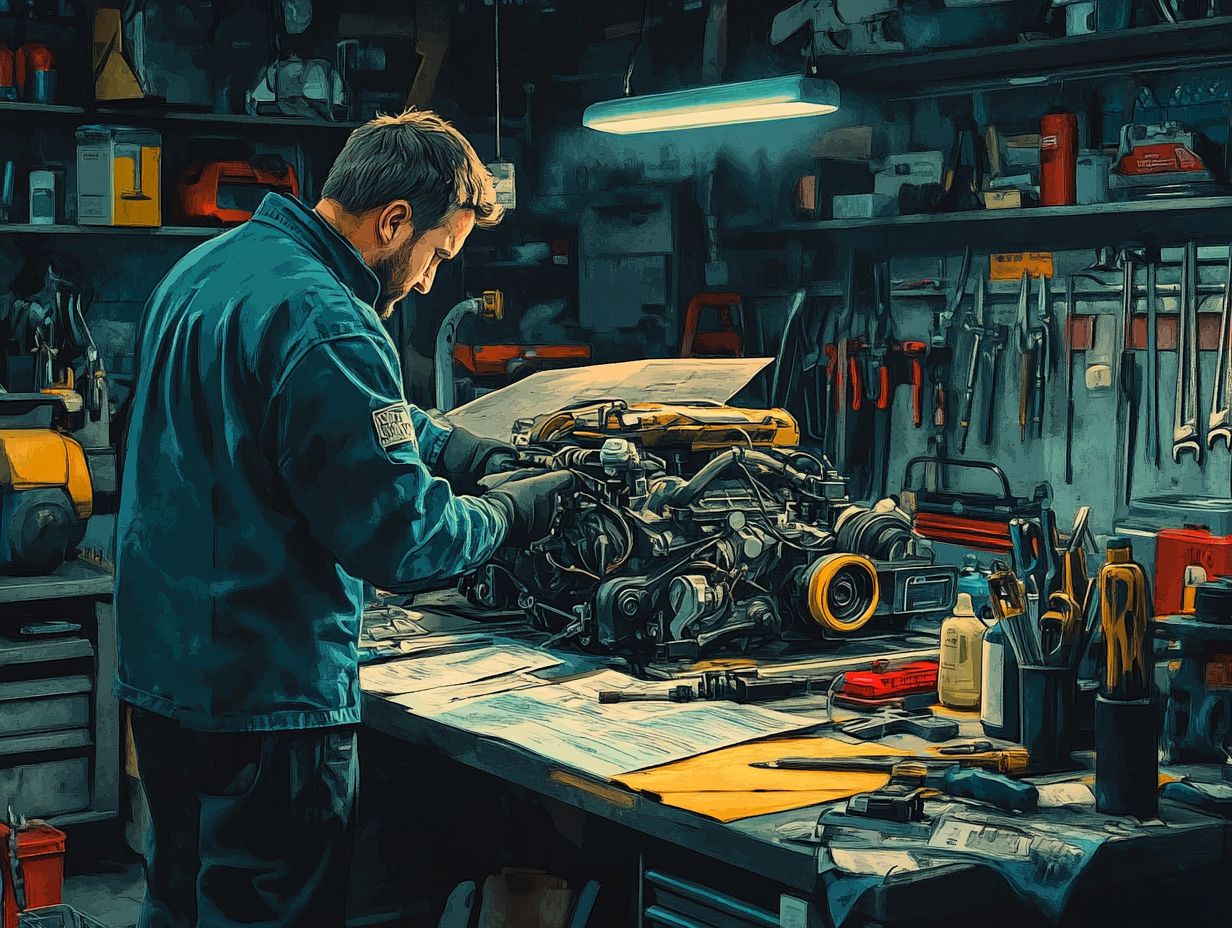
- Understand the different types of car repair warranties, including manufacturer’s and extended warranties, to determine which best suits your needs.
- Be aware of what is covered and what is excluded in your car repair warranty, as well as any limitations that may affect your coverage.
- Maximize the benefits of your car repair warranty by following proper steps when needing a repair and utilizing tips to maximize coverage and benefits.
Overview of Car Repair Warranties
Car repair warranties offer vital protection for your vehicle against unforeseen repairs, shielding you from the burden of steep repair costs whether the issues are minor or major. To learn more about these protections, it’s helpful to understand new car warranties. These warranties act as a reliable safety net, granting you peace of mind by ensuring that many potential car problems are covered under your agreement.
Understand different warranty options, such as manufacturer warranties and extended warranties. This understanding empowers you to make informed decisions about your vehicle’s maintenance plan and financial safeguards against those unexpected repair expenses.
What is a Car Repair Warranty?
A car repair warranty, often referred to as a vehicle service contract (a type of agreement that covers repair costs), is a legal agreement crafted to shield you from unexpected repair and maintenance costs, offering financial protection against those hefty repair bills.
These warranties act as a vital safety net for vehicle owners like you, ensuring that managing repair expenses doesn’t mean dipping into your savings or taking out loans. To understand the full benefits, it’s important to know what to expect from a new car warranty. Unlike standard insurance policies that typically address accidents and liability, car repair warranties focus specifically on mechanical failures and parts replacement.
This distinction is crucial, as warranty agreements often outline the specific components covered ranging from powertrains to electrical systems and these can vary greatly among different providers. By grasping these nuances, you empower yourself to make informed decisions regarding your coverage options, securing peace of mind when those unexpected automotive issues arise.
Types of Car Repair Warranties
Car repair warranties can be classified into several distinct types, including the manufacturer’s warranty, extended warranty, powertrain warranty, bumper-to-bumper coverage, dealer warranty, and third-party warranty. Additionally, it’s important to consider understanding rental and loaner car warranties, as each of these options provides varying levels of protection and coverage specifics, designed to cater to your individual needs and preferences.
Manufacturer’s Warranty
The manufacturer s warranty is usually provided at the time of purchase and covers essential components of your vehicle, such as the powertrain, for a specified period or mileage. This ensures that repairs are carried out at authorized facilities within the limits set out in the warranty agreement.
It’s vital for you as a vehicle owner to recognize that not all parts fall under this warranty. Generally, routine maintenance items like brakes and tires are excluded. The duration of the warranty can vary widely between manufacturers, so it’s crucial to examine the specifics of each policy.
To maintain the warranty s validity, adhering to the prescribed maintenance schedules is imperative. Failing to follow these guidelines could result in a voided warranty, leaving you responsible for potentially hefty repair costs. Therefore, having a clear understanding of your warranty documents empowers you to make informed decisions regarding your vehicle s upkeep.
Extended Warranty

An extended warranty, or vehicle service contract, adds an important layer of financial protection beyond the manufacturer s warranty. It covers more repairs and allows you to get reimbursements for repairs at non-dealer facilities.
This added security is especially helpful as you deal with the wear and tear from daily driving. By choosing the right coverage, you can tailor the plan to meet your needs, whether it s protecting major components or covering routine maintenance.
The potential savings on repair costs can be significant. Today s complex vehicles can rack up expenses quickly, but knowing you won t face unexpected repair bills helps you enjoy a worry-free driving experience.
Many drivers find that investing in an extended warranty is a smart choice that improves their vehicle ownership experience.
What is Covered by a Car Repair Warranty?
Car repair warranties cover various parts and labor related to essential components of your vehicle, such as the engine, transmission, and electrical systems. Make sure to review the specific exclusions and coverage limits in the warranty; these details are crucial when you need to file a claim.
Parts and Labor Coverage
Parts and labor coverage generally includes critical components like the engine, transmission, and electrical systems. This ensures that mechanical failures are resolved without exorbitant repair costs.
Many warranties also cover components like the fuel system, brakes, and air conditioning, all vital for safe driving. However, coverage can vary significantly among warranty providers, so compare their plans.
Some may provide comprehensive plans that include items like the cooling system and suspension, while others may limit coverage to select parts. Examine the warranty terms closely to understand any limitations or exclusions, empowering you to make an informed decision for your vehicle.
Exclusions and Limitations
Exclusions and limitations outline what isn t covered by car repair warranties. Common exclusions include routine maintenance, wear-and-tear items, and specific conditions listed in the warranty paperwork.
As a car owner, understanding these exclusions can help you avoid unexpected expenses. Typical wear-and-tear components, like brake pads, tires, and batteries, are often excluded from coverage, and situations like damage from neglect or unauthorized repairs can void your claims.
Grasping these limitations enables you to make informed choices and prepare financially when your vehicle needs repairs. Knowing what s not covered can save you significant costs and spare you from unpleasant surprises.
How to Use a Car Repair Warranty
Using a car repair warranty requires understanding the claim process. Ensure repairs are carried out at authorized facilities to keep your coverage intact.
Familiarize yourself with the coverage options in your warranty agreement. This may include benefits like roadside assistance and a repair fund for emergencies.
Steps to Take When Needing a Repair
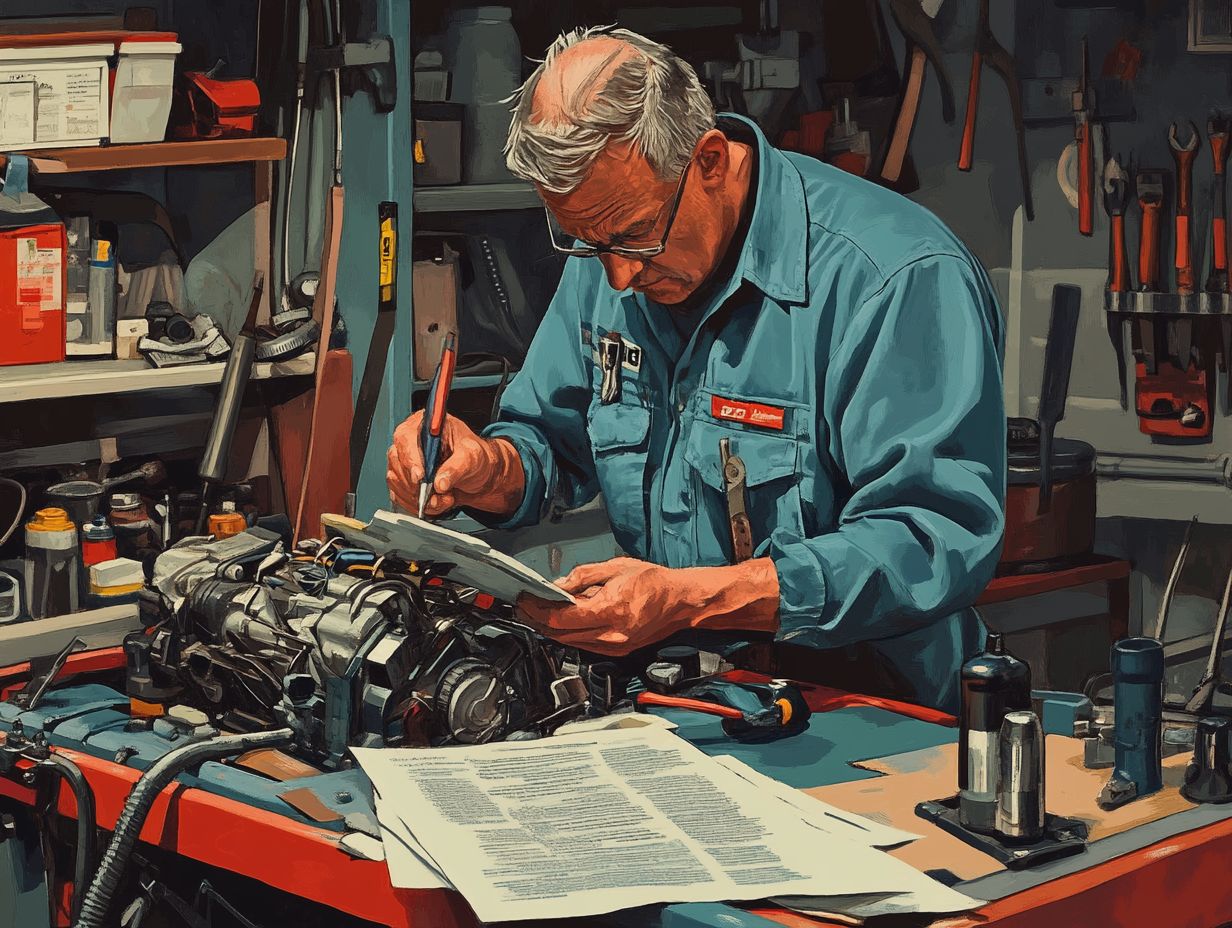
When you find yourself in need of a repair covered by your car warranty, your first move is to gather the warranty paperwork. This document outlines the claim process and serves as your roadmap.
Next, reach out to an authorized repair facility to discuss the specifics of your vehicle and the associated repair costs.
It s absolutely vital to document any issues with your vehicle carefully. Take photographs or write detailed descriptions, as this information will strengthen your claim. Keep a comprehensive record of all previous maintenance and repairs to demonstrate that you ve adhered to the warranty requirements.
Once you ve gathered everything, you re on your way to a smoother repair experience! Make sure you understand the warranty s coverage limits. After completing these preparations, initiate your claim by following the specific procedures set forth by your warranty provider.
By following these steps, you can quickly enjoy the benefits of your warranty.
Making the Most of Your Car Repair Warranty
To truly make the most of your car repair warranty, you need to grasp how to maximize coverage and benefits effectively. It s essential to recognize potential warranty scams that could undermine your investment.
Use customer reviews to find trustworthy providers. This not only secures peace of mind but also safeguards you financially against unforeseen repair costs.
Tips for Maximizing Coverage and Benefits
To truly maximize coverage and benefits of a car repair warranty, take the time to thoroughly review the warranty offerings. Seeking out customer reviews for reliable repair facilities can provide valuable insights.
Understanding the steps to get your repair costs covered is crucial for ensuring you receive optimal protection. Comparing different warranty providers is essential to find the one that aligns perfectly with your needs.
Consider aspects like coverage duration and any service exclusions that may apply. Engaging with online forums and community groups can also offer wisdom from fellow car owners who have faced similar situations.
Maintaining regular communication with your service provider will help clarify any uncertainties regarding claims and coverage.
By being proactive and well-informed, you can safeguard your investment and elevate your overall experience with your car repair warranty.
Frequently Asked Questions
What is a car repair warranty?
A car repair warranty is a type of guarantee provided by a car manufacturer or dealership that covers any repairs needed for a specific period of time or mileage, and understanding your car’s warranty and maintenance can help you make the most of this coverage.
What types of repairs are typically covered under a car repair warranty?
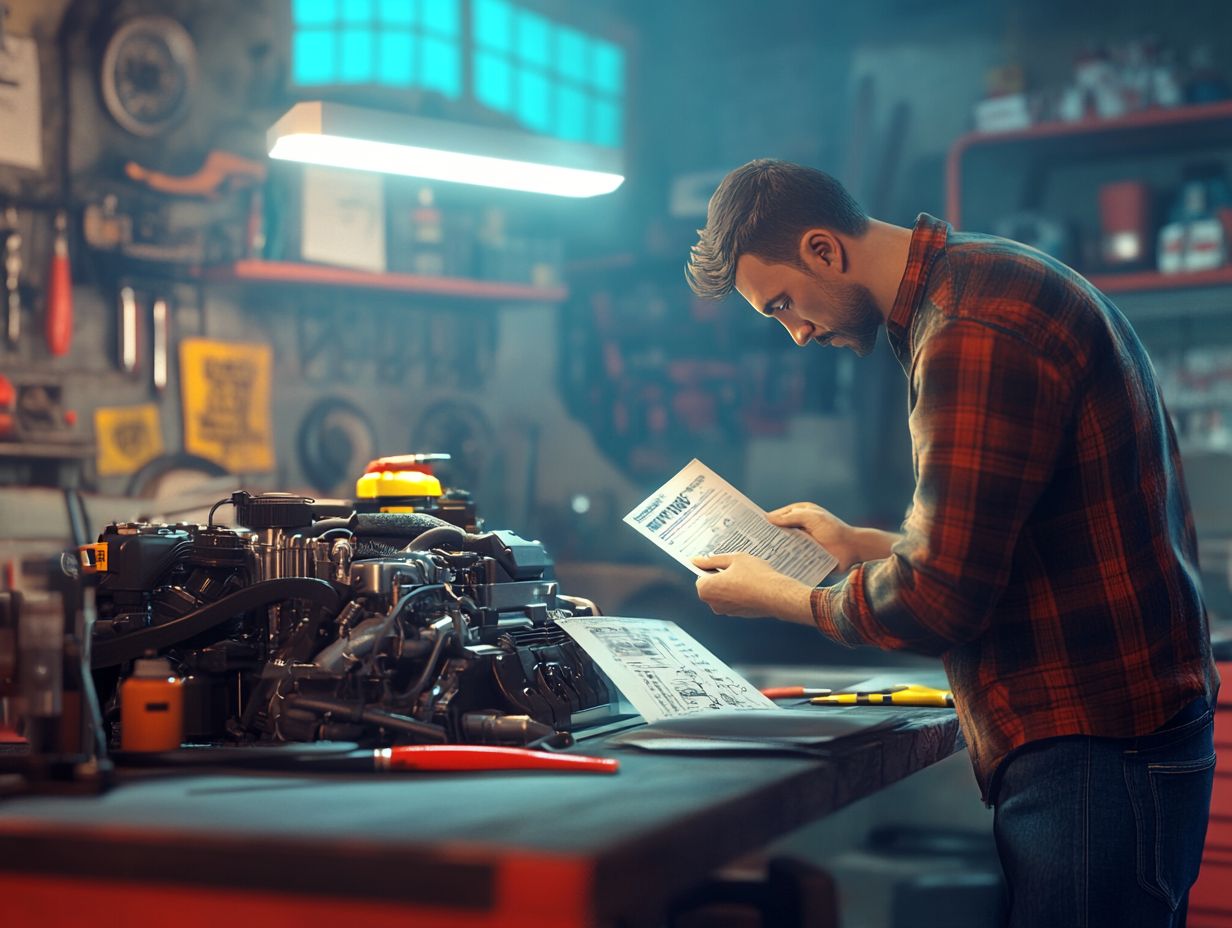
Common car repair warranties cover mechanical and electrical issues, such as engine, transmission, and electrical system repairs. For a deeper insight, check out understanding used car warranties, as some warranties also cover wear and tear items, such as brakes and tires.
How long do car repair warranties typically last?
The duration of a car repair warranty varies, but most standard warranties last for 3-5 years or 36,000-60,000 miles, whichever comes first. To navigate any issues effectively, it’s crucial to understand the claims process for car warranties. Some manufacturers may offer extended warranties for additional coverage.
Are car repair warranties transferable?
Whether a warranty is transferable depends on the terms. Some warranties are transferable to a new owner if the car is sold, while others are only valid for the original owner. It s important to read the details of the warranty to understand its transferability.
What is the difference between a car repair warranty and a maintenance plan?
A car repair warranty covers unexpected repairs due to mechanical or electrical failures, while a maintenance plan covers routine services and wear and tear items. Warranties are typically included with the purchase of a new car, while maintenance plans are optional add-ons.
Can I still get repairs covered under a car repair warranty if I go to an independent mechanic?
Wondering if your car repair warranty covers independent mechanics? Let’s break it down!
It depends on the specific warranty. Some require repairs to be done at a certified dealership, while others may allow you to go to an independent mechanic as long as they use parts made by the car’s brand.
Always check the terms of your warranty before getting repairs done. This way, you can avoid unexpected costs!

